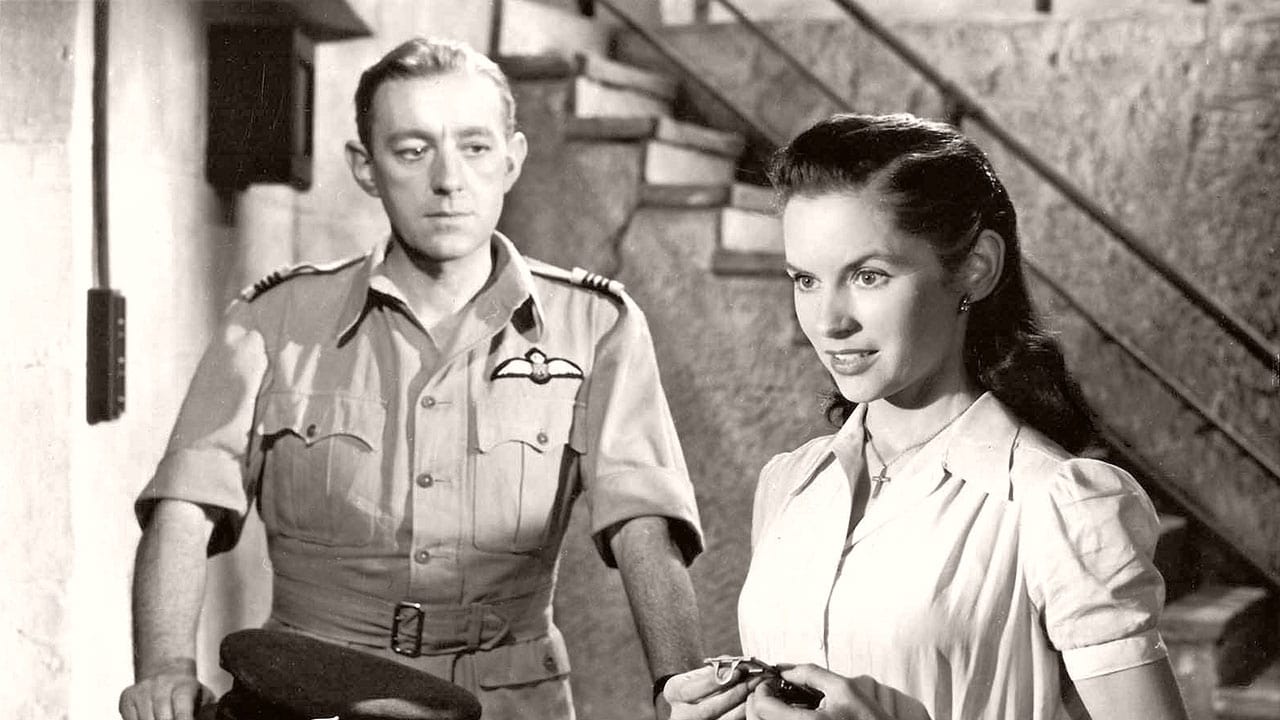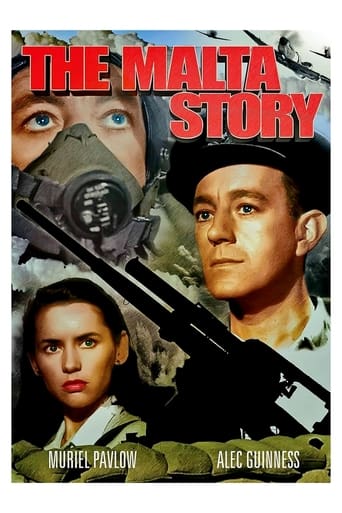



one of my absolute favorites!
Gripping story with well-crafted characters
I like movies that are aware of what they are selling... without [any] greater aspirations than to make people laugh and that's it.
View MoreIf you're interested in the topic at hand, you should just watch it and judge yourself because the reviews have gone very biased by people that didn't even watch it and just hate (or love) the creator. I liked it, it was well written, narrated, and directed and it was about a topic that interests me.
View More"The Malta Story" isn't a particularly memorable War film. It is rather routine and ordinary and Alec Guinness isn't exactly having to stretch his acting muscles that much. That isn't meant as a criticism necessarily. I'm guessing the actor felt that "The Malta Story" was a bit less demanding after reading his copy of the script. Therefore, his approach to the film was to make enough effort with his performance to be professional. If that were the case, his approach was the correct one. The story concerns the R.A.F being stationed in Malta (and filmed there) and Alec Guinness playing just one of many pilots who have been posted. The narrative doesn't seem to rise above the ordinary, just as with the dialogue. It is the kind of dialogue that has been repeated many a time in War films but with more imagination. Jack Hawkins does his usual as the posh, stiff upper lip character whilst cast as a commanding officer. He was never one of the most exciting actors in the world but is ok here. The two leading ladies have little to do or to offer. The romantic subplot is utterly pointless and adds nothing to this film. Anthony Steel - totally forgotten these days - is merely a "pretty boy" name with no acting ability whatever. He soon faded from public memory by the early 1960s and good riddance! The location photography may benefit "The Malta Story" from a technical standpoint but it can't disguise the boring script and pace. Luckily, such a distinguished actor like Alec Guinness will be long remembered for his defining films. There is no way that the above War film can be mentioned in the same breath as "Ice Cold in Alex," "Dunkirk" or "I Was Monty's Double."
View MoreThe Siege of Malta was one of the most heroic episodes of the Second World War. The fall of France and the entry of Italy into the war had turned much of the Mediterranean into an Axis lake, and yet the British forces and the Maltese people were able to defend this small island, less than sixty miles from the coast of Sicily, against repeated German and Italian air attacks. This successful defence, however, was mounted at a heavy cost in lives among the defending forces, among the civilian population and among the naval forces struggling to bring desperately needed supplies to the beleaguered island. The importance of Malta to the Allied war effort was that it could be used as a base from which the British could mount attacks on convoys bringing supplies to the Axis forces in North Africa.This epic story, therefore, was a natural subject for one of those "how-we-won-the-war" films which were such a mainstay of the British cinema during the fifties, and this is the result. It does not deal with the whole of Malta's role in the war; there is, for example, no mention of the three famous Gloster Gladiator biplanes, "Faith, Hope and Charity" which defended the island in 1940. It deals with the climax of the siege in the summer and winter of 1942, the period of most intense aerial bombardment, and combines a semi-documentary approach with a fictional love story between an RAF pilot and a Maltese girl.The Wikipedia entry for this film describes Alec Guinness as "cast against type". Now it is true that Guinness made surprisingly few war films for a British actor of his generation compared to contemporaries like John Mills or Kenneth More, but he was such a versatile actor that he didn't really have a "type"- in one film alone, "Kind Hearts and Coronets", he had played several different characters. An RAF pilot was just one more to add to his gallery of roles.His character here, Flight Lieutenant Peter Ross, is an archaeologist in civilian life who has qualified as a pilot in order to photograph archaeological sites from the air. Because of this, he becomes an RAF photo reconnaissance pilot and is stranded in Malta en route to a posting in Egypt. The RAF in Malta are able to put his experience to good use and he plays a vital role in combating enemy attacks. He manages, however, to find enough spare time not only to explore the island's archaeological sites but also to romance a local girl, Maria.A subplot deals with Maria's brother Giuseppe, who is arrested as an Italian spy. This subplot is perhaps the most interesting aspect of the film, as it contains a relatively sympathetic portrayal of a Fascist sympathiser. Even though he knows that he faces execution as a traitor, Giuseppe does not attempt to deny that he is working for Italian intelligence or that he was attempting to obtain information which, had he succeeded, would have been of great assistance to the Axis forces. He is, however, depicted not as an evil character (as Axis sympathisers generally were in British movies) but as an honourable if misguided one. Giuseppe was partly based upon a real-life individual, Carmelo Borg Pisani, but there is a significant difference. Giuseppe is portrayed as being motivated by Maltese nationalism, whereas Pisani was not a nationalist but an advocate of the annexation of Malta by Fascist Italy.The original script had a happy ending, with Peter surviving and marrying Maria. The producer J. Arthur Rank, however, was not satisfied and brought in Nigel Balchin to rewrite the script. In the film as actually made Peter dies heroically while on a mission to locate an Italian convoy taking vital supplies to Libya. Some have queried whether the style of acting exemplified here is in keeping with the overall tragic tone, but I have no problem with it. Since the sixties it has been fashionable to mock the so-called "stiff upper lip", but in wartime an attitude of "Keep Calm and Carry On" (to quote from that poster which has recently become such a cultural meme) was absolutely indispensable; without it British resolve would have crumbled. In war films like this one, therefore, the relatively restrained style of acting favoured by Guinness and his co-stars seems quite appropriate."Malta Story" is perhaps not the greatest of the many British war films from this period, and has certainly never achieved the popularity of something like "The Dambusters". It is, however, a well-made example of the genre with some well-realised (by the standards of the period) recreations of aerial combat, and helps to keep alive a story which, though proudly remembered in Malta itself, is often overlooked in Britain. 7/10
View MoreIn the opening scene of "Malta Story" Mr A.Guinness bore such a startling resemblance to Noel Coward that I fully expected his first words to be "Certain women need striking regularly - like gongs" or some such world - weary bon mot.Unfortunately his dialogue is hardly deathless prose and even the Master would have had trouble bringing it to life.Indeed Mr Guinness wanders through the picture as if looking for a focal point and failing to find one.And therein lies the fatal weakness of the whole movie.Mr J.Hawkins likewise gives up early on and ends up giving a "Jack Hawkins" performance without an ounce of individuality.It could have been spliced from any of a dozen British war movies.Many of the early fifties usual suspects turn up and do their schtick to very little purpose. The Luftwaffe failed to bomb Malta into submission in much the same way as it failed to bring London to its knees.The courage of the Maltese people in the face of incessant danger was recognised by the King and the island was awarded the George Cross.A worthy subject you might think for a movie,but "Malta Story" does not even qualify for the term "worthy" in its most patronising sense.It gives the appearance of being hastily cobbled together to meet a deadline,perhaps before the actors lost the will to live.
View MoreIt is a gripping story that is told about the efforts made to make use of that stationary aircraft carrier in the middle of the Mediterranean. It is also poignant that Alec Guinness should play the part of a reconnaissance pilot because it is just this ruse that the British used to pretend that they hadn't broken the Italian and German ciphers thus enabling them to sink all the Gerry troop ships and always be just in time everywhere. A lame performance by the cast is diverted by the backdrop of a desperate situation on a tiny island that has been invaded by every great power since anyone can remember. If Ultra hadn't done it stuff these people would have been run over even though the Axis forces would have lost the war in the long run.
View More